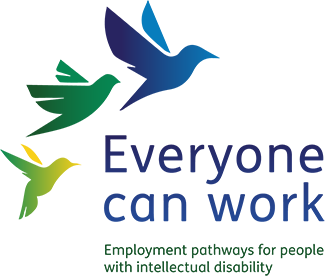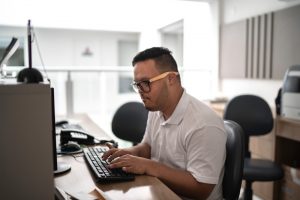How people with intellectual disability learn about work
We’re used to the idea that most learning happens in the classroom. However, the learning style of many people with intellectual disability means that they learn best when they’re on the job.
Learning on the job means you learn about what happens at work, and the jobs you like doing, through practical, hands-on training.
There’s lots of evidence to show that this approach has good results for people with intellectual disability. This is because many people with intellectual disability find it difficult to transfer knowledge from one setting (e.g. a classroom) into another setting (e.g. a workplace).
Many people with intellectual disability have gotten a paid job after building their skills doing time-limited on-the-job experience in open employment or Australian Disability Enterprises (ADEs). Through work experience, you can learn work skills and get ‘work ready’. This is sometimes called ‘learning in situ’ or ‘place-then-train’.
Choosing a SLES or other employment support provider
School Leaver Employment Support (SLES) funding is available in National Disability Insurance Scheme (NDIS) plans as a key support for young people transitioning between school and work. SLES is individualised support available for up to two years. It’s designed to help young people build enough skills and experience to access a Disability Employment Service (DES), or get a job.
However, there has been a huge increase in the number of day programs offering one-size-fits-all, classroom-based SLES ‘programs’. These programs are typically two years long. Students spend 2–3 days a week in the classroom learning about work, with only a few work experience days each year. NDIS participants thinking about signing up to a SLES provider should find out more information before they sign up. You should ask:
- How are people individually supported?
- How much work experience placement is there?
- How many (or what percentage of) people have transitioned from the SLES program to DES or a job in the last couple of years?
- How many SLES participants stayed with that same provider doing community participation activities rather than open employment?
It’s important to remember that disability service providers may experience a conflict of interest between ‘losing’ a participant to a job or ‘keeping’ a participant as an NDIS client.
Can you learn about work at an ADE?
Many ADEs say they support people to develop the practical skills they need to enter open employment. However, research shows that once people start working at an ADE, it’s unlikely they will enter open employment.
In 2020, the NDIS made new rules about the funding and supports an ADE is allowed to provide. This may improve this situation by encouraging ADEs to genuinely support people to transition into open employment. However, the conflict of interest between ‘losing’ a participant to a job and ‘keeping’ a participant as an NDIS client may still be an issue.
If you work in an ADE and want to work in open employment, there are options available. They include:
- asking your ADE to support you to move to open employment
- asking Centrelink for support from a DES
- creating an employment-related goal in your NDIS plan and using your NDIS funding to pay for the support you need.
You can also try to get on-the-job experience through a paid, casual job, similar to other people aged 15 or over.
Intellectual disability describes a range of impairments, experiences and characteristics. It can involve difficulty with communication, memory, understanding, problem solving, fine and gross motor skills, and everyday life skills.Read more Open employment is when people with and without disability work together in regular jobs.
Read more An Australian Disability Enterprises (ADE) is a type of employment support for people with disability who need significant support to work.
Read more National Disability Insurance Scheme (NDIS) School Leaver Employment Supports (SLES) is a type of employment support you can pay for with NDIS funding. It can help young people to get ready for work.
Read more The Australian Government-funded disability insurance scheme that funds supports for eligible people with disability.
Read more Disability Employment Services (DES) is the Australian Government’s employment service that can help people with disability find work and keep a job in open employment.
Read more Day programs provide activities for groups of people with disability. These activities can include recreation and developing general skills.
Read more



